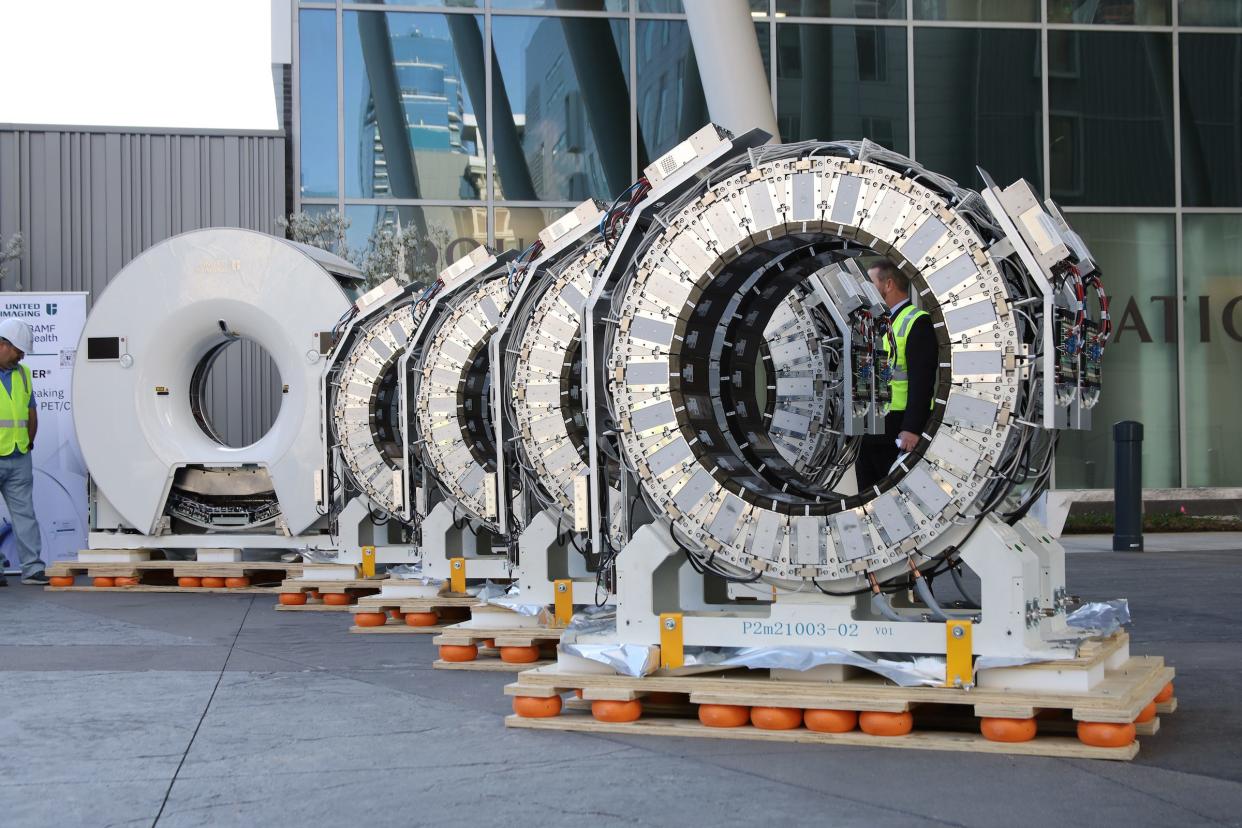Advanced cancer scanner coming to Michigan State University radiopharmacy in Grand Rapids

GRAND RAPIDS — A new piece of equipment — the first of its kind in Michigan — that will start operation this summer at Michigan State University’s radiopharmacy will mean quicker cancer diagnoses.
The full-body PET-CT scanner, housed in the university's radiopharmacy at the Bold Advanced Medical Future Health clinic in the Doug Meijer Medical Innovation Building, is the only such device dedicated for clinical use nationwide.
BAMF Health expects to officially open this summer and begin treating patients with medical conditions such as prostate cancer and neuroendocrine cancer.
The scanner is up to 40 times faster than normal CT or PET scanners, according to MSU College of Human Medicine Division of Radiology and Biomedical Director Mark DeLano. It features increased sensitivity, he added, requiring lower doses of radiation during scans and providing earlier detection of diseases.
“We’re going to learn things about the distributions of medicines and where cancers are that we wouldn’t otherwise know,” DeLano said.
He expects this “major advancement in PET/CT scanner technology” ultimately will lead to improved therapeutic guidance for all cancers.

The machine cost $15 million to $20 million and can complete its scans in one minute, compared to typical PET or CT scans that can take 20 to 45 minutes. The new machine is capable of detecting signs of cancer as small as 2 millimeters, compared to 7 to 10 millimeters, or about 1 centimeter, for a traditional scan.
The machine also is capable of larger scans than traditional devices.
A traditional scan can only cover 20 to 30 centimeters, but the new machine is capable of scans of 194 centimeters, meaning a single scan for people up to approximately 6 feet, 5 inches tall.
The scanner can also be safely used with children. A typical PET and CT scanner puts children at radiation risk, according to Anthony Chang, CEO and founder of BAMF Health, but with the new machine, radiation dosages can be reduced.
One of the capabilities of the scanner is the ability to track medication within the body, showing doctors and researchers where medicine goes once introduced into the patient. Doctors also can inject radioactive drugs, known as tracers, that enable them to see blood flow in real-time as the tracer moves throughout the body.
Treating metastatic prostate cancer and metastatic neuroendocrine cancer will be the main focus for BAMF Health, said BAMF Health Grand Rapids Medical Director Brandon Mancini. For both of those diagnoses, patients will undergo a PET scan with the new scanner to confirm the diagnosis and select appropriate therapy.
“To have the best PET scan in the world, to be able to do that with the resolution that we’re talking about, the decreased radiation dose and the speed time, it’s going to allow us to get the most accurate information and therefore treat patients the absolute best,” he said.
Patients will receive more personalized care, officials said. When they visit the clinic for a scan, Mancini said, they won’t receive the same dose of radiation as every other patient. Instead, doctors will tailor each person’s radiation based on the information gleaned from the initial PET scan.
“We also want to be the world’s leader in doing this theranostics treatment and in order to do so, you need the best technology that also allows a lot of patients to be able to come through the clinic,” he said. “It contributes to an amazing experience, it contributes to our opportunity to help hundreds and hundreds and thousands of patients in a very short period of time and puts us in position to perform clinical trials at both small and large scale and to expand the use beyond just prostate cancer and neuroendocrine cancer.”
“We’re really trying to achieve intelligence-based precision medicine, instead of a one-size-fits-all type of method,” Chang added. “We collect the right information using (artificial intelligence) to turn it into useful intelligence and use that intelligence to treat the patient.”
The clinic will use two cyclotrons, or particle accelerators,to make radiopharmaceuticals and isotopes, which are the radioactive portion of the tracers doctors will inject into patients.
Doug Meijer and the Meijer Foundation in 2019 provided $19.5 million to the College of Human Medicine to support the radiopharmacy, including the cyclotrons and PET scanners.
“This is going to be a really remarkable facility that is really made possible by the Meijer family,” Delano said. “It’s a really exciting time to be in medicine in the state of Michigan.”
Contact Mark Johnson at (517) 377-1026 or majohnson2@lsj.com. Follow him on Twitter at @ByMarkJohnson.
This article originally appeared on Lansing State Journal: Advanced cancer scanner coming to Michigan State radiopharmacy in GR

